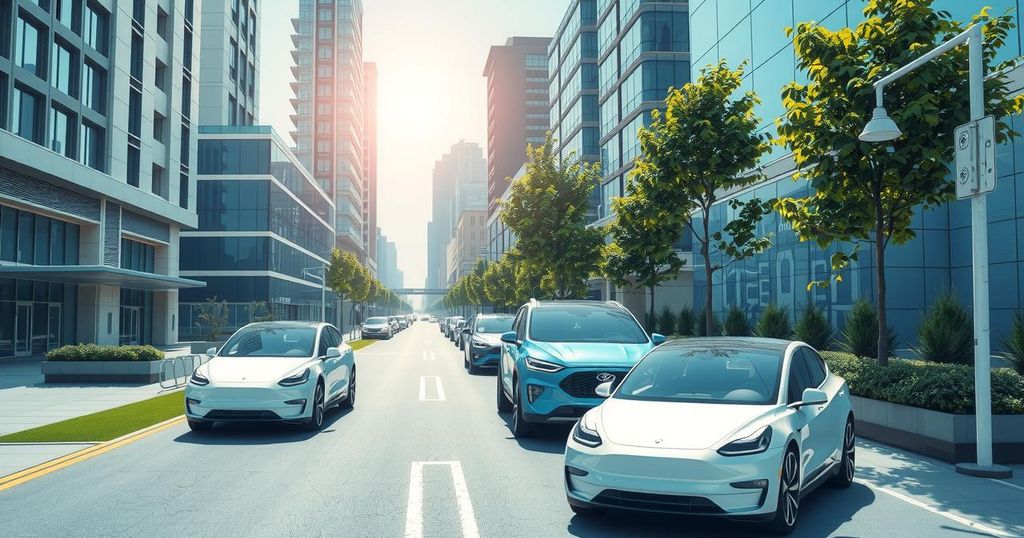Chinese Automakers Surge Ahead with Travel Technology Innovations

- Chinese automakers like BYD and Chery are reshaping industry norms.
- The Omoda 5 SUV shows Chery’s rapid adaptability for foreign markets.
- BYD’s vertical integration enhances control over production and costs.
- Chery has established a strong international presence, exporting over a million vehicles in 2024.
- Price competition from Chinese brands poses a threat to traditional automakers.
China’s Automotive Innovation Blazing a Trail
China’s automotive industry is undeniably in a state of flux, revolutionizing not just the local market but also making impressive forays into global arenas. Key players like BYD and Chery are not merely keeping pace; they are surging ahead, with remarkable reductions in vehicle development times and a focus on electric vehicles that some Western manufacturers are struggling to match. The implications of this rapid advancement cannot be overstated, as it presents both challenges and opportunities for traditional automakers in Europe, the U.S., and beyond.
Chery’s Omoda 5 Highlights Agile Manufacturing
Chery’s recent work on the Omoda 5 SUV is a standout illustration of this speed and adaptability. Originally designed for the Chinese market’s smoother roads, the SUV was modified for the harsher environments of Europe in just six weeks. Riccardo Tonelli, a senior expert at Chery, highlighted how such nimbleness would be nearly inconceivable for a European automaker, who generally operates with more bureaucracy and longer timelines. This ability to streamline vehicle development is a considerable advantage that is enabling these companies to not only meet local demands but also seize opportunities in foreign markets rapidly.
BYD Leads Through Vertical Integration
BYD has become a hallmark of China’s automotive expansion, displaying phenomenal sales growth—over 3.7 million units sold in 2024 compared to only 400,000 in 2020. This surge indicates a significant shift, bolstered by BYD’s ability to produce many components, such as batteries, in-house. The firm’s vertical integration allows it unrivaled control over production timelines, which aids in introducing new models faster than competitors. Moreover, BYD’s strategy of introducing about 40 new models post-2020 offers a stark contrast to the more stagnant rollout observed in many traditional automakers, emphasizing its aggressive approach in a fast-evolving landscape.
Chery’s Global Expansion Strategy
In addition to BYD, Chery is also carving out a niche internationally, having established a presence in over 100 countries and exporting approximately 1.14 million vehicles in 2024 alone. Such global ambitions are evident through their strategy of rapid adaptation to meet distinct market needs—like updating the Omoda 5 for European driving conditions. Moreover, Chery consistently creates several design prototypes to quickly pivot when necessary, ensuring they stay relevant and responsive to market shifts. This second-wave innovation is a marked departure from the lengthy development cycles that legacy automakers often face.
Growing Competitive Threats to Traditional Automakers
The influence of Chinese automakers is creating ripples across the global automotive industry, posing formidable challenges to legacy manufacturers in Europe and the U.S. The sharp reduction in development times—often by more than 50%—has caught traditional car makers off guard. In a bid to keep up, these established players are desperate to speed up their own development processes, recognizing the threats posed by rapid Chinese innovation. Companies like General Motors, Toyota, and Volkswagen see the storm brewing and know that maintaining market share requires a swift and decisive response.
Price Competition Reshapes Global Automotive Market
Price competition adds another layer to this landscape, with many Chinese brands offering vehicles at pricing significantly lower than traditional automakers. This has made them especially appealing to economically conscious consumers, especially in emerging markets where affordability plays a crucial role in purchasing decisions. As Chinese brands continue to bolster their global foothold with quality, high-tech vehicles, the game is increasingly tilting in their favor, posing a significant challenge to the established norms in traditional markets. The rapid innovation pace in China’s automotive sector shows no sign of dissipating anytime soon, and traditional players have to get ahead of this growing trend.
Future Prospects for Chinese Automakers
The sector’s future holds promise for Chinese automakers as they focus on innovation, agility, and affordability. However, challenges persist, particularly in overcoming skepticism from Western consumers regarding quality and brand recognition. Despite these hurdles, companies like BYD and Chery are poised to continue their upward trajectory, leveraging technological advantages and production efficiencies. This positions them as key players not just in China, but globally—reshaping the automotive landscape as they lead the transition toward electric vehicles and sustainable mobility. The rise of Chinese automakers signals a noteworthy shift in the global automotive market, one that could redefine competitive boundaries in the years ahead.
In summary, the undeniable rise of Chinese automakers, especially BYD and Chery, has disrupted the global automotive landscape by showcasing unparalleled speed in vehicle development and an impressive adaptation to market demands. With substantial growth in international markets and innovations that outpace traditional methods, these companies are set to redefine industry standards. While challenges exist, the agility and responsiveness of Chinese automakers present formidable competition to western counterparts as the automotive sector evolves toward a new era of electric vehicles and sustainable practices.





